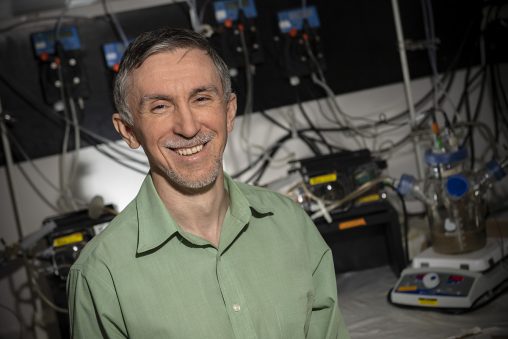
Oleg Paliy, Ph.D., associate professor of biochemistry and molecular biology at Wright State, will conduct research on the gut microbiota of Egyptian teenagers as part of his Fulbright Fellowship.
Oleg Paliy, Ph.D., associate professor of biochemistry and molecular biology at Wright State University, has been awarded a Fulbright Fellowship.
The Fulbright is one of the most prestigious and competitive fellowship programs for academic faculty across the world. The program, which is administered by the U.S. Department of State, was established in 1946 with the goal of improving intercultural relations between Americans and other countries through the exchange of people, knowledge and skills.
The program got its start under the legislation introduced by U.S. Senator J. William Fulbright of Arkansas. Since then, it has given more than 360,000 students, scholars, teachers, artists and scientists the opportunity to study, teach and conduct research, exchange ideas and contribute to finding solutions to shared international concerns.
As a Fulbright Scholar, Paliy will travel to Giza-Cairo, Egypt, in the summer of 2023 to conduct research in collaboration with his long-term colleague Laila Hussein, a professor at the National Research Center in Egypt.
Their research will assess how supplementation of the diet of teenagers in Egypt with soluble plant fiber might modify their gut microbiota. Paliy said that Egyptian children often suffer from GI tract illnesses such as diarrhea.
“Soluble fiber is a type of food component that is not degraded by human enzymes, and thus we do not absorb it. Instead, it goes through our stomach and small intestine and reaches the colon,” he said. “In the colon, there are trillions of microbes, which in contrast to us, can break down the fiber and use it as a food source. Resident ‘good’ microbes can use the fiber much better than the pathogens. So, adding such fiber to the diet can increase the numbers of beneficial microbes in Egyptian children’s guts and therefore make it harder for pathogens to infect these kids, which in turn will prevent GI tract illness.”
Paliy said that the Fulbright program will provide him with the unique opportunity to carry out the research project, which will combine his expertise in molecular and computational microbiology with his Egyptian collaborator’s research experience in conducting human nutrition studies.
“We hope that the results of such a project will benefit Egyptian children and will provide nutritional guidance to improve their gut health,” Paliy said. “The Fulbright program facilitates the project by providing travel, accommodation and research support for the U.S. Fulbright Scholar to conduct research in Egypt.”
Paliy joined Wright State in 2004 as an assistant professor in the Department of Biochemistry and Molecular Biology, originally to work on a collaborative project between the Boonshoft School of Medicine and the Air Force Research Laboratory.
While at Wright State, he developed an expertise in the field of human gut microbiota.
“We study how microbes that every human houses in their gut affect our health and how they might participate in the gastrointestinal diseases,” he said. “We are especially interested in the role of different nutrients and diets in affecting the gut microbiota, in other words, how specific changes to the foods we eat might influence our tiny friends and as a result affect our health and well-being.”
Paliy said that is the complexity of and figuring out how different combinations of microbes are connected to human nutrition, health, and diseases that attracted him to this field of research.
“Since my secondary education is in math, this area of research also allows me to draw on that experience and knowledge as many complex mathematical and statistical algorithms are used to analyze such a complex system,” he said.
Paliy grew up in Ukraine and received his combined bachelor’s and master’s degrees in molecular microbiology from the Lviv National University. He received his Ph.D. in microbiology, molecular and structural biology at the University of Manchester in Great Britain. He then did postdoctoral work at the University of California–Berkeley from 2001 to 2004.

 Walking through open doors
Walking through open doors  Adventures await
Adventures await  Wright State to expand nursing facilities to meet workforce needs and prepare more graduates for in-demand careers
Wright State to expand nursing facilities to meet workforce needs and prepare more graduates for in-demand careers  Wright State student-athletes make a lasting impact on local family with more to come
Wright State student-athletes make a lasting impact on local family with more to come  Wright State names Rajneesh Suri dean of Raj Soin College of Business
Wright State names Rajneesh Suri dean of Raj Soin College of Business 